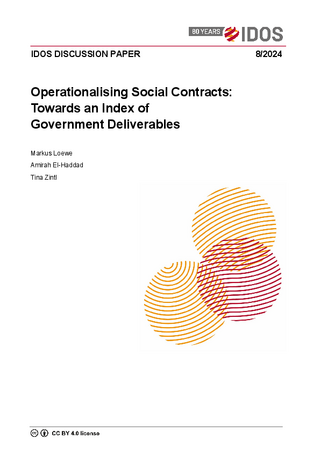Operationalising social contracts: towards an index of government deliverables
Loewe, Markus / Amirah El-Haddad / Tina ZintlDiscussion Paper (8/2024)
Bonn: German Institute of Development and Sustainability (IDOS)
ISBN: 978-3-96021-233-1
DOI: https://doi.org/10.23661/idp8.2024
Preis: 6 €
The international development debate is increasingly referring to the notion of the “social contract” – often, however, without a clear definition of the term and its implications. We therefore make a suggestion for measuring at least some elements of social contracts in order to make it easier to compare them across time and space. We build on a concept developed earlier, according to which social contracts are the “entirety of explicit or implicit agreements between all relevant societal groups and the sovereign (i.e. the government or any other actor in power), defining their rights and obligations towards each other” (Loewe, Zintl, & Houdret, 2021, p. 3). Specifically, we develop indices to capture the three “Ps” that governments can deliver to societies: protection against internal and external threats, provision of social and economic services, and allowing political participation. These indices are composed of indicators for the different aspects or dimensions of the three Ps. We use mainly input variables to gauge the willingness of governments to deliver the three Ps because outcome variables depend on too many other factors influencing the efficiency of the political process. In a second step, we calculate the values of 154 countries for all three indices around the year 2019. The results prove that the three indices are useful and valid. Their values stretch over a large range (almost from 0 to 1), but their means and medians are on similar levels, which shows that the indices are well-scaled. Also, they correlate to a high degree with each other and with other indicators such as per capita income and the Human Development Index, which proves their concurrent validity. Yet, these correlations are not perfect, which means that the three indices add information about the performance of governments in different countries. Finally, we even make a first step in identifying patterns in the results. Particularly, we find noticeable geographic clusters of social contracts with similar characteristics: For example, countries in Latin America were doing comparatively well on average in terms of political participation in 2019. Governments in sub-Saharan Africa, in turn were delivering disproportionately well on average in terms of protection and political participation if we take per capita income levels into consideration, but less so in terms of provision. And countries in the Middle East and North Africa tended to fail mainly with regard to political participation. Finally, our approach also allows for comparisons across sub-indices, that is, the different aspects of protection, provision and participation.




